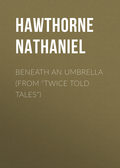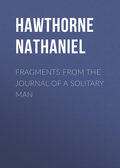MRS. HUTCHINSON
The character of this female suggests a train of thought which will form as natural an Introduction to her story, as most of the Prefaces to Gay's Fables, or the tales of Prior; besides that, the general soundness of the moral may excuse any want of present applicability. We will not look for a living resemblance of Mrs. Hutchinson, though the search might not be altogether fruitless. But there are portentous indications, changes gradually taking place in the habits and feelings of the gentle sex, which seem to threaten our posterity with many of those public women, whereof one was a burden too grievous for our fathers. The press, however, is now the medium through which feminine ambition chiefly manifests itself; and we will not anticipate the period (trusting to be gone hence ere it arrive) when fair orators shall be as numerous as the fair authors of our own day. The hastiest glance may show how much of the texture and body of cisatlantic literature is the work of those slender fingers from which only a light and fanciful embroidery has heretofore been required, that might sparkle upon the garment without enfeebling the web. Woman's intellect should never give the tone to that of man; and even her morality is not exactly the material for masculine virtue. A false liberality, which mistakes the strong division-lines of Nature for arbitrary distinctions, and a courtesy, which might polish criticism, but should never soften it, have done their best to add a girlish feebleness to the tottering infancy of our literature. The evil is likely to be a growing one. As yet, the great body of American women are a domestic race; but when a continuance of ill-judged incitements shall have turned their hearts away from the fireside, there are obvious circumstances which will render female pens more numerous and more prolific than those of men, though but equally encouraged; and (limited, of course, by the scanty support of the public, but increasing indefinitely within those limits) the ink-stained Amazons will expel their rivals by actual pressure, and petticoats wave triumphantly over all the field. But, allowing that such forebodings are slightly exaggerated, is it good for woman's self that the path of feverish hope, of tremulous success, of bitter and ignominious disappointment, should be left wide open to her? Is the prize worth her having, if she win it? Fame does not increase the peculiar respect which men pay to female excellence, and there is a delicacy (even in rude bosoms, where few would think to find it) that perceives, or fancies, a sort of impropriety in the display of woman's natal mind to the gaze of the world, with indications by which its inmost secrets may be searched out. In fine, criticism should examine with a stricter, instead of a more indulgent eye, the merits of females at its bar, because they are to justify themselves for an irregularity which men do not commit in appearing there; and woman, when she feels the impulse of genius like a command of Heaven within her, should be aware that she is relinquishing a part of the loveliness of her sex, and obey the inward voice with sorrowing reluctance, like the Arabian maid who bewailed the gift of prophecy. Hinting thus imperfectly at sentiments which may be developed on a future occasion, we proceed to consider the celebrated subject of this sketch.
Mrs. Hutchinson was a woman of extraordinary talent and strong imagination, whom the latter quality, following the general direction taken by the enthusiasm of the times, prompted to stand forth as a reformer in religion. In her native country, she had shown symptoms of irregular and daring thought, but, chiefly by the influence of a favorite pastor, was restrained from open indiscretion. On the removal of this clergyman, becoming dissatisfied with the ministry under which she lived, she was drawn in by the great tide of Puritan emigration, and visited Massachusetts within a few years after its first settlement. But she bore trouble in her own bosom, and could find no peace in this chosen land. She soon began to promulgate strange and dangerous opinions, tending, in the peculiar situation of the colony, and from the principles which were its basis, and indispensable for its temporary support, to eat into its very existence. We shall endeavor to give a more practical idea of this part of her course.
It is a summer evening. The dusk has settled heavily upon the woods, the waves, and the Trimountain peninsula, increasing that dismal aspect of the embryo town, which was said to have drawn tears of despondency from Mrs. Hutchinson, though she believed that her mission thither was divine. The houses, straw thatched and lowly roofed, stand irregularly along streets that are yet roughened by the roots of the trees, as if the forest, departing at the approach of man, had left its reluctant footprints behind. Most of the dwellings are lonely and silent: from a few we may hear the reading of some sacred text, or the quiet voice of prayer; but nearly all the sombre life of the scene is collected near the extremity of the village. A crowd of hooded women, and of men in steeple-hats and close-cropped hair, are assembled at the door and open windows of a house newly built. An earnest expression glows in every face; and some press inward, as if the bread of life were to be dealt forth, and they feared to lose their share; while others would fain hold them back, but enter with them, since they may not be restrained. We, also, will go in, edging through the thronged doorway to an apartment which occupies the whole breadth of the house. At the upper end, behind a table, on which are placed the Scriptures and two glimmering lamps, we see a woman, plainly attired, as befits her ripened years: her hair, complexion, and eyes are dark, the latter somewhat dull and heavy, but kindling up with a gradual brightness. Let us look round upon the hearers. At her right hand his countenance suiting well with the gloomy light which discovers it, stands Vane, the youthful governor, preferred by a hasty judgment of the people over all the wise and hoary heads that had preceded him to New England. In his mysterious eyes we may read a dark enthusiasm, akin to that of the woman whose cause he has espoused, combined with a shrewd worldly foresight, which tells him that her doctrines will be productive of change and tumult, the elements of his power and delight. On her left, yet slightly drawn back, so as to evince a less decided support, is Cotton, no young and hot enthusiast, but a mild, grave man in the decline of life, deep in all the learning of the age, and sanctified in heart, and made venerable in feature, by the long exercise of his holy profession. He, also, is deceived by the strange fire now laid upon the altar; and he alone among his brethren is excepted in the denunciation of the new apostle, as sealed and set apart by Heaven to the work of the ministry. Others of the priesthood stand full in front of the woman, striving to beat her down with brows of wrinkled iron, and whispering sternly and significantly among themselves as she unfolds her seditious doctrines, and grows warm in their support. Foremost is Hugh Peters, full of holy wrath, and scarce containing himself from rushing forward to convict her of damnable heresies. There, also, is Ward, meditating a reply of empty puns, and quaint antitheses, and tinkling jests that puzzle us with nothing but a sound. The audience are variously affected; but none are indifferent. On the foreheads of the aged, the mature, and strong-minded, you may generally read steadfast disapprobation, though here and there is one whose faith seems shaken in those whom lie had trusted for years. The females, on the other hand, are shuddering and weeping, and at times they cast a desolate look of fear around them; while the young men lean forward, fiery and impatient, fit instruments for whatever rash deed may be suggested. And what is the eloquence that gives rise to all these passions? The woman tells then (and cites texts from the Holy Book to prove her words) that they have put their trust in unregenerated and uncommissioned men, and have followed them into the wilderness for nought. Therefore their hearts are turning from those whom they had chosen to lead them to heaven; and they feel like children who have been enticed far from home, and see the features of their guides change all at once, assuming a fiendish shape in some frightful solitude.
These proceedings of Mrs. Hutchinson could not long be endured by the provincial government. The present was a most remarkable case, in which religious freedom was wholly inconsistent with public safety, and where the principles of an illiberal age indicated the very course which must have been pursued by worldly policy and enlightened wisdom. Unity of faith was the star that had guided these people over the deep; and a diversity of sects would either have scattered them from the land to which they had as yet so few attachments, or, perhaps, have excited a diminutive civil war among those who had come so far to worship together. The opposition to what may be termed the Established Church had now lost its chief support by the removal of Vane from office, and his departure for England; and Mr. Cotton began to have that light in regard to his errors, which will sometimes break in upon the wisest and most pious men, when their opinions are unhappily discordant with those of the powers that be. A synod, the first in New England, was speedily assembled, and pronounced its condemnation of the obnoxious doctrines. Mrs. Hutchinson was next summoned before the supreme civil tribunal, at which, however, the most eminent of the clergy were present, and appear to have taken a very active part as witnesses and advisers. We shall here resume the more picturesque style of narration.
It is a place of humble aspect where the elders of the people are met, sitting in judgment upon the disturber of Israel. The floor of the low and narrow hall is laid with planks hewn by the axe; the beams of the roof still wear the rugged bark with which they grew up in the forest; and the hearth is formed of one broad, unhammered stone, heaped with logs that roll their blaze and smoke up a chimney of wood and clay. A sleety shower beats fitfully against the windows, driven by the November blast, which comes howling onward from the northern desert, the boisterous and unwelcome herald of a New England winter. Rude benches are arranged across the apartment, and along its sides, occupied by men whose piety and learning might have entitled them to seats in those high councils of the ancient church, whence opinions were sent forth to confirm or supersede the gospel in the belief of the whole world and of posterity. Here are collected all those blessed fathers of the land, who rank in our veneration next to the evangelists of Holy Writ; and here, also, are many, unpurified from the fiercest errors of the age, and ready to propagate the religion of peace by violence. In the highest place sits Winthrop, – a man by whom the innocent and guilty might alike desire to be judged; the first confiding in his integrity and wisdom, the latter hoping in his mildness, Next is Endicott, who would stand with his drawn sword at the gate of heaven, and resist to the death all pilgrims thither, except they travelled his own path. The infant eyes of one in this assembly beheld the fagots blazing round the martyrs in Bloody Mary's time: in later life he dwelt long at Leyden, with the first who went from England for conscience' sake; and now, in his weary age, it matters little where he lies down to die. There are others whose hearts were smitten in the high meridian of ambitious hope, and whose dreams still tempt them with the pomp of the Old World and the din of its crowded cities, gleaming and echoing over the deep. In the midst, and in the centre of all eyes, we see the woman. She stands loftily before her judges with a determined brow; and, unknown to herself, there is a flash of carnal pride half hidden in her eye, as she surveys the many learned and famous men whom her doctrines have put in fear. They question her; and her answers are ready and acute: she reasons with them shrewdly, and brings Scripture in support of every argument. The deepest controversialists of that scholastic day find here a woman, whom all their trained and sharpened intellects are inadequate to foil. But, by the excitement of the contest, her heart is made to rise and swell within her, and she bursts forth into eloquence. She tells them of the long unquietness which she had endured in England, perceiving the corruption of the Church, and yearning for a purer and more perfect light, and how, in a day of solitary prayer, that light was given. She claims for herself the peculiar power of distinguishing between the chosen of man, and the sealed of Heaven, and affirms that her gifted eye can see the glory round the foreheads of saints, sojourning in their mortal state. She declares herself commissioned to separate the true shepherds from the false, and denounces present and future judgments on the laud, if she be disturbed in her celestial errand. Thus the accusations are proved from her own mouth. Her judges hesitate; and some speak faintly in her defence; but, with a few dissenting voices, sentence is pronounced, bidding her go out from among them, and trouble the land no more.
Mrs. Hutchinson's adherents throughout the colony were now disarmed; and she proceeded to Rhode Island, an accustomed refuge for the exiles of Massachusetts in all seasons of persecution. Her enemies believed that the anger of Heaven was following her, of which Governor Winthrop does not disdain to record a notable instance, very interesting in a scientific point of view, but fitter for his old and homely narrative than for modern repetition. In a little time, also, she lost her husband, who is mentioned in history only as attending her footsteps, and whom we may conclude to have been (like most husbands of celebrated women) a mere insignificant appendage of his mightier wife. She now grew uneasy away frown the Rhode Island colonists, whose liberality towards her, at an era when liberality was not esteemed a Christian virtue, probably arose from a comparative insolicitude on religious matters, more distasteful to Mrs. Hutchinson than even the uncompromising narrowness of the Puritans. Her final movement was to lead her family within the limits of the Dutch jurisdiction, where, having felled the trees of a virgin soil, she became herself the virtual head, civil and ecclesiastical, of a little colony.
Perhaps here she found the repose hitherto so vainly sought. Secluded from all whose faith she could not govern, surrounded by the dependants over whom she held an unlimited influence, agitated by none of the tumultuous billows which were left swelling behind her, we may suppose that, in the stillness of Nature, her heart was stilled. But her impressive story was to have an awful close. Her last scene is as difficult to be described as a shipwreck, where the shrieks of the victims die unheard, along a desolate sea, and a shapeless mass of agony is all that can be brought home to the imagination. The savage foe was on the watch for blood. Sixteen persons assembled at the evening prayer: in the deep midnight their cry rang through the forest; and daylight dawned upon the lifeless clay of all but one. It was a circumstance not to be unnoticed by our stern ancestors, in considering the fate of her who had so troubled their religion, that an infant daughter, the sole survivor amid the terrible destruction of her mother's household, was bred in a barbarous faith, and never learned the way to the Christian's heaven. Yet we will hope that there the mother and child have met.









